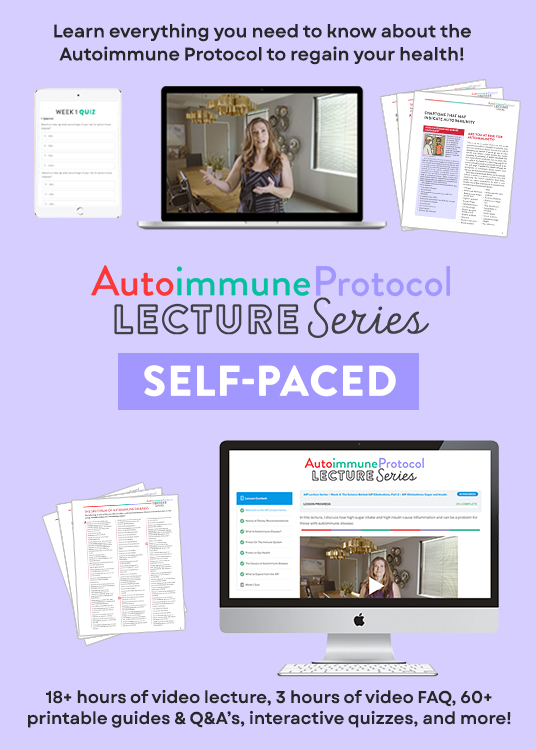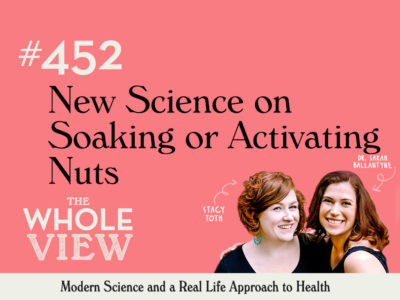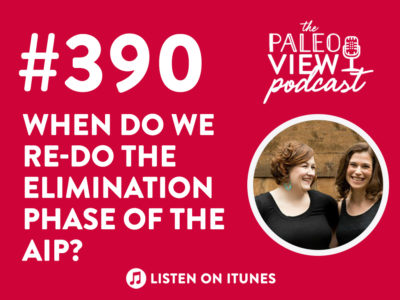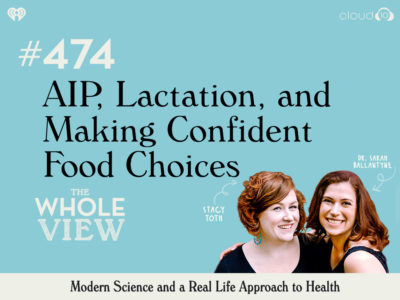On this week’s show, Stacy and Sarah dedicate an entire episode to talk about the second most consumed beverage after water, coffee! News outlets have shared mixed reports on this favored beverage for years. So what is the truth? Is coffee good for your health? Tune in to episode 379 to find out!
If you enjoy the show, please review it on iTunes!
The Paleo View (TPV), Episode 379: Let’s Talk About Coffee
Stacy and Sarah are back again, with Sarah leading the charge this week. (0:40)
Sarah likes to think of last week’s episode as a hodgepodge.
When Stacy structured last week’s episode she wanted it to be a catch-up show that was worth listeners’ time, and she hopes everyone enjoyed it!
This week’s episode is about coffee.
Coffee has come up in probably half of the episodes because Stacy and Sarah so commonly receive questions around that topic.
Before diving in, Stacy thanked this week’s sponsor, Clean Coffee Company.
This brand is both delicious and goes above and beyond when it comes to ensuring that their beans are toxin-free.
You can use the code ’15paleoview’ at this link to receive 15% off your order.
On this episode, Stacy and Sarah are going to talk a lot about the research from the last couple of years looking at the effects of coffee, and overall the data has been mixed.
There is a thought throughout a number of studies that the potential concerns for some people for coffee consumption have to do with coffee quality.
Save 70% Off the AIP Lecture Series!
Learn everything you need to know about the Autoimmune Protocol to regain your health!
I am loving this AIP course and all the information I am receiving. The amount of work you have put into this is amazing and greatly, GREATLY, appreciated. Thank you so much. Taking this course gives me the knowledge I need to understand why my body is doing what it is doing and reinforces my determination to continue along this dietary path to heal it. Invaluable!
Carmen Maier

Quality is very important for a number of reasons, which is why Sarah has fallen in love with Clean Coffee Co.
Sarah fell in love with the flavor of their coffee first, and their practices around the quality testing second. It is very impressive how controlled and clean it is.
It is very important to source a coffee that is being very transparent about their farming practices.
The Science
To Sarah coffee is a hot topic.
It is the second most consumed beverage after water.
Coffee is a major trade commodity as well.
There have been a lot of news stories highlighting the way science has flip-flopped on whether coffee is good or bad for you. (10:02)
These discussions have used this situation to say that scientists don’t really know what they are talking about.
Sarah shared on the communication challenge between academic labs and media outlets.
The scientific consensus is an important piece to understand in this all.
With coffee, there have been a number of really well done, big studies, meta-analysis, that have reached scientific consensus.
In the last couple of decades leading up to this point, the media has oversimplified the findings from these studies.
The way these studies were shared did not accurately share how science is done.
Coffee does have some really exciting health benefits for most people.
There are over 800 phytochemicals in coffee.
There are also a number of antioxidants that have a variety of important properties.
Coffee also contains some unique fiber types. There is half a gram of fiber per cup of coffee.
There are two types of fiber present, and studies have shown that these two types increase levels of Bifidobacteria.
These fibers also reduce the growth of problematic E. coli and Clostridium species.
They help with the production of short-chain fatty acids.
There have been some exciting studies looking at the application of coffee in terms of the gut microbiome.
There was one study, in particular, looking at why coffee might reduce diabetes risk.
The study showed that coffee consumption was able to prevent diet-related changes to the gut microbiome.
Breaking It Down Further
Chlorogenic acids (CGAs) are compounds known as the most potent antioxidants found in coffee. (20:15)
CGAs are believed to be a major contributor to coffee’s health effects, with the proposed mechanism being CGA impacts cell signaling pathways that contribute to the onset of degenerative diseases.
There have been some interesting studies showing that CGAs help us metabolize different toxins and they impact our blot clotting.
Polyphenols change the composition of the gut microbiome in a good way; they suppress the growth of pathogens while increasing the growth of probiotics.
Coffee has a triple whammy in terms of the gut microbiome.
It is both the unique fiber in coffee, as well as these polyphenols that are benefiting gut microbiome composition.
Another important compound in coffee is Trigonelline. (22:33)
This compound is known to be hypoglycemic, neuroprotective, protect against cancer, impact estrogen levels, and it has some antibacterial properties as well.
Coffee beverages are one of the only sources of melanoidins in the human diet.
These compounds act similarly to dietary fiber without actually being fiber.
Research shows that the amount of coffee melanoidins that reach the colon with heavy coffee consumption is one of the proposed mechanisms for coffee’s anti-colorectal cancer effects.
Sarah shared a bit on the science behind why coffee is often viewed as a laxative.
The Other Side
Not all phytochemicals are linked with only health benefits. (25:49)
There are a couple that have potential cholesterol-raising properties.
It is interesting because they have anti-cancer effects, while also potentially raising cholesterol.
Sarah shared an example of how broccoli has a similar situation with its phytochemicals and the cost-benefit analysis.
The Health Benefits of Coffee
This is where the landmark studies have solidified coffee as a health-promoting beverage for most people. (28:28)
Two huge meta-analyses that were published two years ago showed a huge reduction in all-cause mortality from coffee consumption.
Sarah explained all-cause mortality in greater detail.
The optimal dose of coffee in one of the studies Sarah explained was found to be three cups of coffee per day.
Three cups of coffee (8 oz.) per day reduced the risk of all-cause mortality by 17%.
The study found that it didn’t matter if the coffee was caffeinated or decaf.
With some of the other health benefits of coffee, the caffeine aspect does matter, but the big picture study showed that decaffeinated was almost as good as caffeinated.
This implies that it is the fiber and the phytonutrients and not the caffeine in the coffee that is having the impact.
This is also another strong argument for seeking high-quality coffee.
There is a reduction in deaths from cardiovascular disease (19% risk reduction), coronary heart disease (16% risk reduction), and strokes (30% risk reduction).
These studies are again looking at people who are drinking three cups of coffee a day.
While increasing consumption above three cups doesn’t increase harm, it doesn’t show much benefit, either.
Importantly, women seem to benefit more than men here.
There is also an impact of caffeine on blood pressure. (37:25)
When you have a caffeinated beverage your blood pressure goes up, which is an excepted risk factor of cardiovascular disease.
This seems counterintuitive and is still an unanswered question in this entire field of research.
Stacy shared a bit about how interesting this is because the way people’s reactions to consuming coffee vary so much from person to person.
Sarah touched a bit on energy dips and what causes them.
Energy dips in the afternoon are not normal and are a sign that something could be improved upon in terms of lifestyle.
Stacy noted that this is a good thing to keep an eye on.
These are triggers when your body is trying to communicate a message.
More on the Health Benefits
Drinking coffee reduces the risk of type-2 diabetes by 30%. (44:44)
This is another effect that is seen in both caffeinated and decaffeinated coffee consumption.
Coffee can also reduce the risk of other metabolic diseases.
Specific to caffeinated coffee, there is a decrease in the risk of neurological diseases.
The biggest body of scientific literature is with Parkinson’s disease, showing that coffee consumption reduces the risk of Parkinson’s.
Emerging evidence is showing that it can reduce the risk of depression and other cognitive disorders, including Alzheimer’s disease.
Caffeine increases blood circulation to the brain.
Coffee seems like it could be good for the liver as well.
Studies have found a reduced risk for non-alcoholic fatty liver disease (29% reduction), liver fibrosis (27% reduction), and cirrhosis (39% reduction).
All of these findings were with high consumption or having one extra cup per day.
Coffee also helps with gallbladder health, as high consumers (2-6 cups a day) have a lower risk for gallstone disease.
There is a strong relationship between coffee consumption and reduced cancer risk.
Generally, there is about an 18% reduction in the chances of being diagnosed with cancer in high coffee drinkers.
Researchers have found a lower risk of prostate cancer, endometrial cancer, melanoma, oral cancer, leukemia, non-melanoma skin cancer, and liver cancer.
There is some increased risk with high consumption and certain cancers, specifically lung cancer.
This detail is dependent on smoking status.
Taken all together, we are seeing some really impressive health benefits to regular coffee consumption. (49:16)
Most of those effects are optimized at two to three cups a day.
The Caveats
It is important to recognize that coffee does not work for everybody.
There are some people who would do better to look at other hot beverages.
People with familial hypercholesterolemia should avoid coffee.
With high cholesterol, it is worth experimenting with your coffee intake.
If you are under chronic stress and your cortisol is elevated in the morning, adding a caffeine stimulus to the equation is not going to be beneficial.
When cortisol is not high in the morning, then coffee may be a good stimulus.
If you have difficulty managing stress as it is, caffeine is not helpful to you.
When you have issues with cortisol timing throughout the day, it is worthwhile doing a salivary cortisol panel.
Drinking coffee slightly increases our chance of developing gastroesophageal reflux disease (GERD or “acid reflux).
Although, you could simply find a coffee with lower acid levels.
Sarah explained genes that regulate coffee metabolism and the way this varies from one person to the next. (54:57)
There is some evidence that higher caffeine consumption can increase anxiety.
Be aware of this and talk to a doctor about it if you are experiencing this symptom.
Coffee itself if generally anti-inflammatory.
There are lots of anti-inflammatory antioxidants in coffee.
However, there are also a couple of phytochemicals that may increase inflammation.
Especially in a low-quality coffee, these inflammatory phytochemicals would be higher.
The findings in this research are mixed, so coffee is still eliminated initially on the AIP.
Coffee is a phase one reintroduction because for some it is beneficial and anti-inflammatory.
Talk to your doctor if you have a health condition that might mean that high coffee consumption or high caffeine consumption are not going to benefit you.
Also, be critical in your self-reflection.
Closing Thoughts
Overall the scientific literature shows that the vast majority of us can benefit from two to three cups of coffee a day.
Especially when the coffee is a high-quality coffee.
There is not a one size fits all approach.
Engage with functional integrative medicine and be critical with self-experimentation.
Be willing to re-evaluate when things are not working for you.
This is one of those areas where Stacy and Sarah recommend that you be self-reflective.
Stacy and Sarah shared details on how they prefer their coffee.
Stacy shared a bit more on the way different styles of coffee (ex: shot of espresso vs. brewed) metabolizes differently.
Espresso actually has higher antioxidants and lower caffeine because it is hot water pressed through the grounds at high pressure.
Americanos have less caffeine than brewed coffee.
With cold-brew you are going to miss some of the antioxidants, but you will have lower acidity and lower caffeine.
Be sure to follow the instructions for coffee concentrates.
Just like with anything else, it is important to listen to your body.
Thank you so much for tuning in to this week’s show!
And a huge thank you again to this week’s sponsor, Clean Coffee Company.
Don’t forget, you can use the code ’15paleoview’ at this link to receive 15% off your order.
Thank you for tuning in!
Stacy and Sarah will be back again next week.
If you are tuning in late, Stacy wishes everyone a wonderful Thanksgiving! (1:10:16)
—










